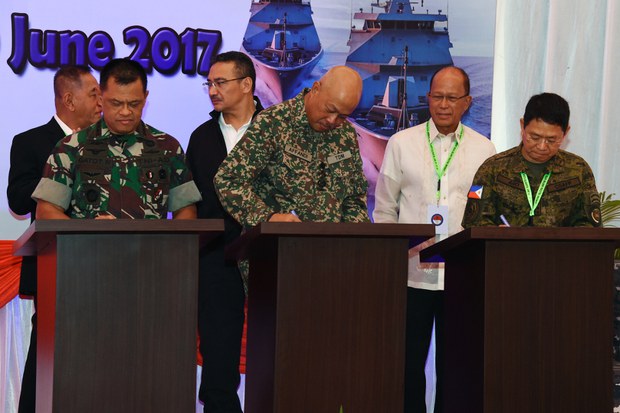Trilateral Patrols in Sulu Sea Won’t Deter Terrorism, Kidnapping: Think Tank
2019.01.09
Jakarta
 Indonesia's military chief Gatot Nurmantyo, Malaysia's military chief Raja Mohamed Affandi, and Philippines’ chief of staff of the armed forces Eduardo Ano sign agreements for trilateral maritime patrols as their respective defense ministers Ryamizard Ryacudu, Hishammuddin Hussein and Delfin Lorenzana look on, Tarakan, Indonesia, June 19, 2017.
Indonesia's military chief Gatot Nurmantyo, Malaysia's military chief Raja Mohamed Affandi, and Philippines’ chief of staff of the armed forces Eduardo Ano sign agreements for trilateral maritime patrols as their respective defense ministers Ryamizard Ryacudu, Hishammuddin Hussein and Delfin Lorenzana look on, Tarakan, Indonesia, June 19, 2017.
Trilateral sea patrols are not likely to stop kidnapping by the southern Philippine militant group Abu Sayyaf or reduce the risk of terrorism, a conflict resolution think tank said in a new report released Wednesday.
The Trilateral Maritime Patrol (TMP), a regional defense initiative launched in June 2017 by the defense ministers of Indonesia, Malaysia and the Philippines, has been hailed as a success by officials.
The initiative was in response to a spate of kidnappings targeting fishing trawlers and tugboats in Sulu and Sulawesi seas by the Abu Sayyaf Group (ASG) gunmen in 2016.
The kidnappings prompted Indonesia to unilaterally suspend the export of coal to the Philippines, valued at an estimated $700 million a year.
But abductions by Abu Sayyaf resumed in September 2018 after a 20-month lull, the Jakarta-based Institute for Policy Analysis of Conflict (IPAC) said. A Malaysian and four Indonesian fishermen were abducted in two operations in late 2018, while a Malaysian tugboat crew was able to thwart a third attack.
“The move toward improved security cooperation between Indonesia, Malaysia and the Philippines is useful to the extent that it can help overcome distrust and improve communication among militaries in the region,” the IPAC report said.
“But policy-makers in the region need to be realistic. None of these measures will stop terrorism or kidnapping in the Sulu-Sulawesi sea,” it said. “They may marginally improve security for commercial shipping when combined with the national coastal patrols, but they are all trying to provide a military answer to a problem that is not fundamentally military in nature.”
Non-military measures such as strengthening law enforcement, information sharing among police forces and more effort to capture and debrief suspects rather than kill them could prove to be more effective in tackling the threat posed by Abu Sayyaf, the report said.
“Analysis of those debriefings is critical to understanding ASG networks and identifying possible policy interventions. In the long term, deterring both kidnapping and terrorism involves addressing deeply entrenched political and economic issues in the Sulu archipelago,” IPAC said.
The patrols were first envisioned in 2016 but the siege of the Marawi city in the southern Philippines by pro-Islamic State militants in May 2017 provided the final impetus.
Maritime patrols were launched the following months and joint air patrols followed in October 2017 – the same month the Marawi siege was finally ended.
Five months of heavy fighting killed at least 1,200 people, mostly militants, including the acknowledged Philippine IS leader Isnilon Hapilon.
The report further argues that trilateral patrols were not effective in preventing foreign militants from entering Mindanao in the southern Philippines to fight alongside local rebels.
“Even if the TMP contributed to the lull in kidnapping, it does not follow that coordinated patrols have been or would be effective in interdicting foreign fighters coming to join the jihad in Mindanao,” it said.
“At the height of the Marawi siege, many would-be combatants traveled by air to Mindanao or were stopped by vigilant police and immigration authorities before they could make contact with Philippine extremists.”
The IPAC report attributed the nearly two-year hiatus to the killing of the ASG’s leading sub-commanders by Philippine and Malaysian security forces, among other factors.
“The question is why suddenly kidnapping resumed and the most logical answer is a pressing need for money – to help local politicians, provide support to fugitives from Marawi, gain the upper hand in clan or family rivalries or simply as a way to survive,” IPAC said.







